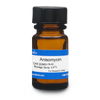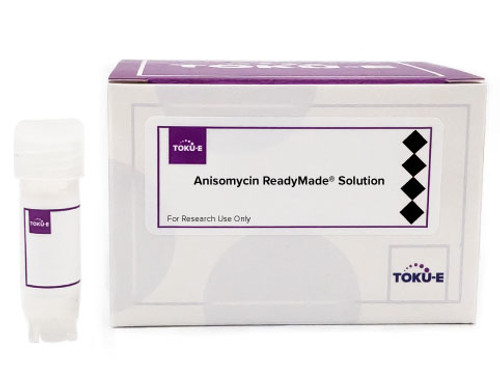Anisomycin is a antibiotic derived from Streptomyces griseolus that inhibits eukaryotic protein synthesis. Anisomycin can activate stress-activated protein kinases, MAP kinase, and other signal transduction pathways. It acts as a JNK activator. Anisomycin is sparingly soluble in water.
Anisomycin is reported to induce apoptosis in a variety of cell types.
We also offer:
- Anisomycin ReadyMadeTM Solution (A226)
| Mechanism of Action | Anisomycin inhibits protein synthesis in eukaryotic cells by inhibiting peptidyl-transferase activity in the 60S subunit of the 80S ribosome. |
| Spectrum | Protozoa |
| Microbiology Applications | Anisomycin is a component of Martin Lewis agar, used for the isolation of Neisseria gonorrhoeae and Neisseria meningtidis. It can also be used in buffered charcoal yeast extract for the selective isolation of Legionella species. |
| Cancer Applications | Anisomycin inhibited growth and induces caspase-dependent apoptosis in a panel of triple negative breast cancer (TNBC) cell lines. It supporessed growth of TNBC in mice. It targets breast cancer angiogenesis through inhibiting capillary network formation, migration, proliferation, and survival in mice. Anisomycin inhibited mitochondrial respiration, and decreased mitochondrial membrane potential and adenosine triphosphate (ATP) level. As a consequence, Anisomycin activated AMPK and inhibited mammalian target-of-rapamycin signaling pathways (Wenjuan et al, 2022). |
| References |
Ehrenkaufer G et al (2020) Identification of Anisomycin, prodigiosin and obatoclax as compounds with broad-spectrum anti-parasitic activity. PLoS Negl. Trop. Dis. 14(3):e0008150 PMID 32196500 Naghdi N, Majlessi N, Bozorgmehr T (2003) The effects of Anisomycin (a protein synthesis inhibitor) on spatial learning and memory in CA1 region of rats hippocampus. Behav Brain Res. 139(1-2):69-73 PMID 12642177 Vazquez D (1974) Anisomycin binding to eukaryotic ribosomes. J. Molec. Biol. 84 (4):603-623 Wenjuan Y, Cuiling Z, Qiushi S and Gege G (2022) Anisomycin inhibits angiogenesis, growth, and survival of triple-negative breast cancer through mitochondrial dysfunction, AMPK activation, and mTOR inhibition. Can. J. Physiol. Pharmacol. 100(7): 612-620 |





